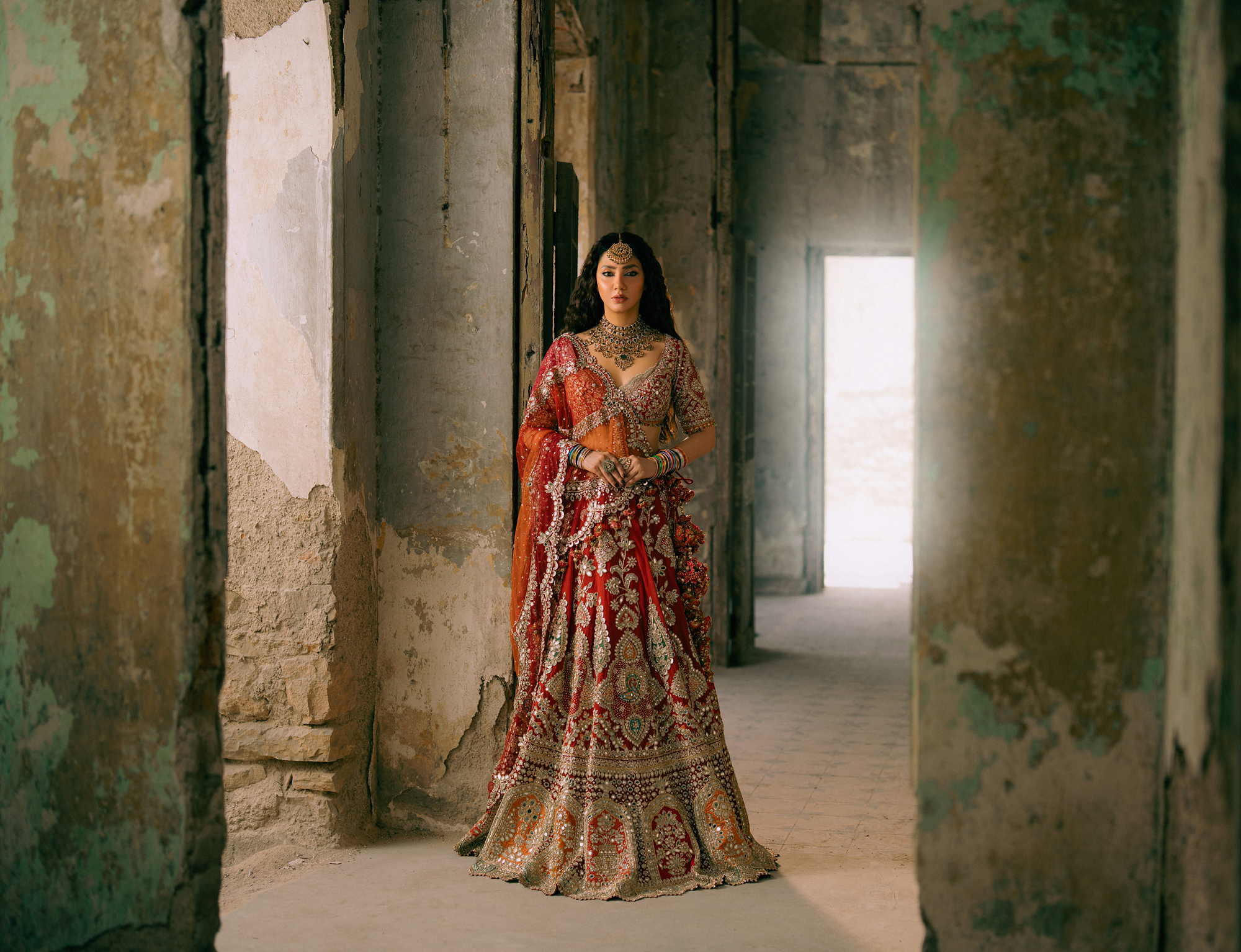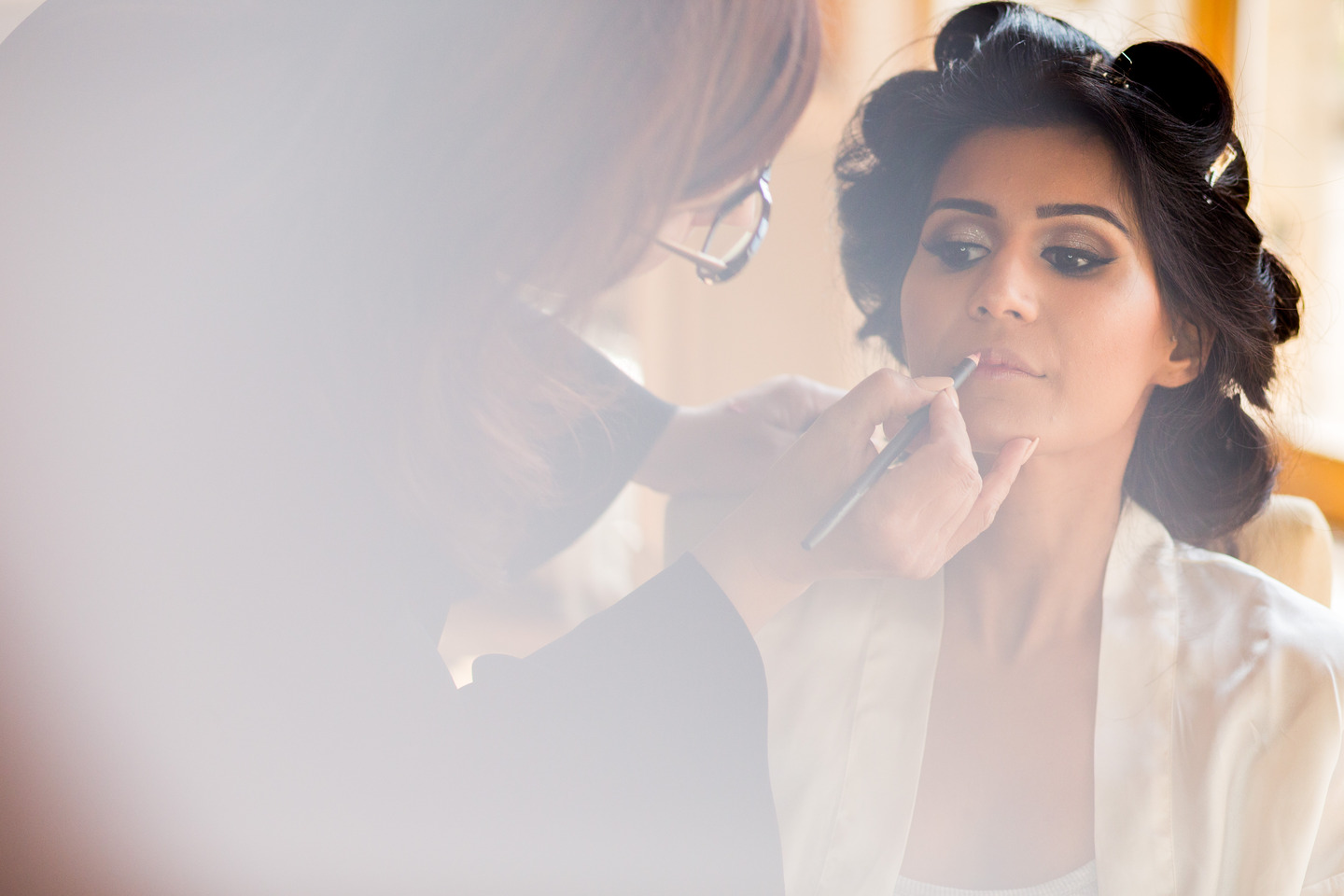The morning mist in Nathiagali curls around the pines like silk scarves. I see this ethereal sight from the square-inch screens of a phone (Mahira Khan’s) and a laptop (mine). “The air here carries something magical,” she tells me. Perhaps it’s the crisp promise of autumn or maybe it’s the infectious laughter spilling from the cozy cabin where Mahira is spending the weekend with her closest girlfriends. It’s not a staged shoot or a curated setting, just an escape where she’s dressed in a humble sweatshirt, curls her feet under her and warms her hands on a steaming mug of chai.
This is what strikes me first about meeting Mahira, the complete absence of artifice. In an industry incepted on illusion, where every gesture is calculated and every word measured, she remains stubbornly, beautifully real. It’s a quality that has defined her two-decade career and made her not just a star, but something rarer: a genuine cultural icon who has never lost touch with her humanity and made millions fall in love with her.
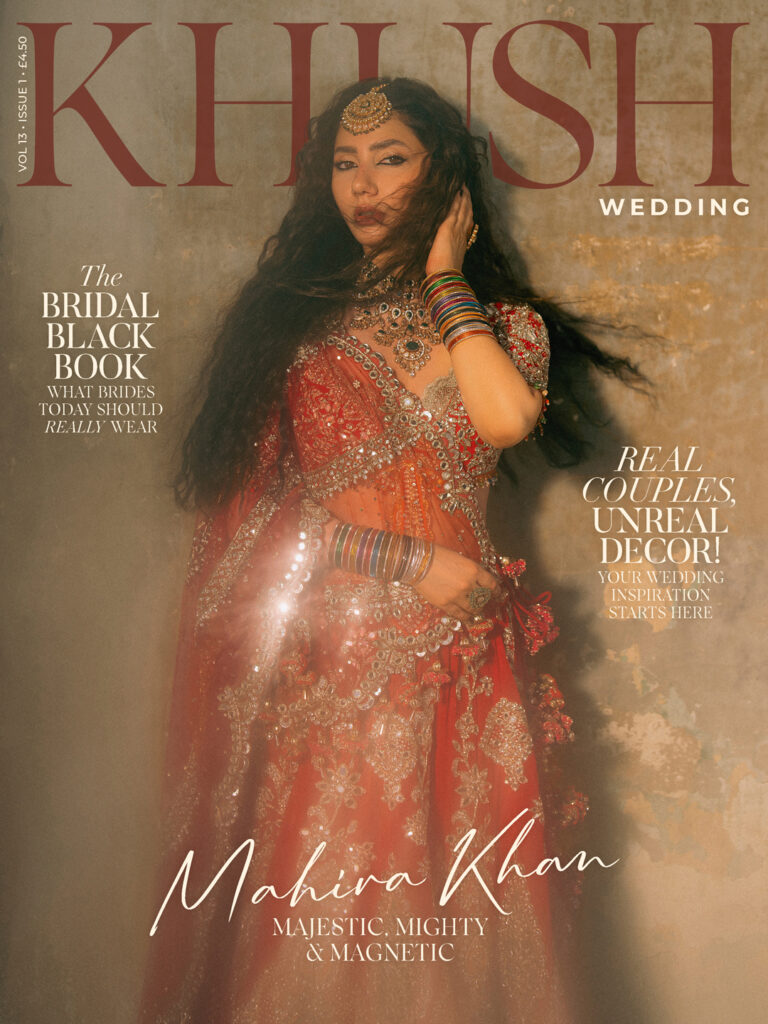
Get your hands on the magazine HERE
“I’m shy, you know,” she tells me almost sheepishly, her hair undone in a way that looks better than most editorial blowouts. “I’ve always been shy. Even as a child, my mother said I was quiet and reserved. But I was a dreamer too. Always dreaming of being in the movies.” There’s a twinkle in her eye as she remembers. “I’d perform for my grandparents before weddings and mehndis and put on a little show for them. My grandfather always balanced it with academic priorities though—he’d clap and then ask about my grades.”
This paradox, Mahira as both the shy dreamer and the unflinching performer, is at the heart of her journey. I tiptoe around this trait that hasn’t left her. Even now, at the height of her career, there’s something wonderfully childlike about her enthusiasm when she discusses her craft. Her face brightens when she talks about the characters she’s inhabited, the stories she’s helped narrate and the impact television has had on her journey.
Small To Silver And Smart Screens
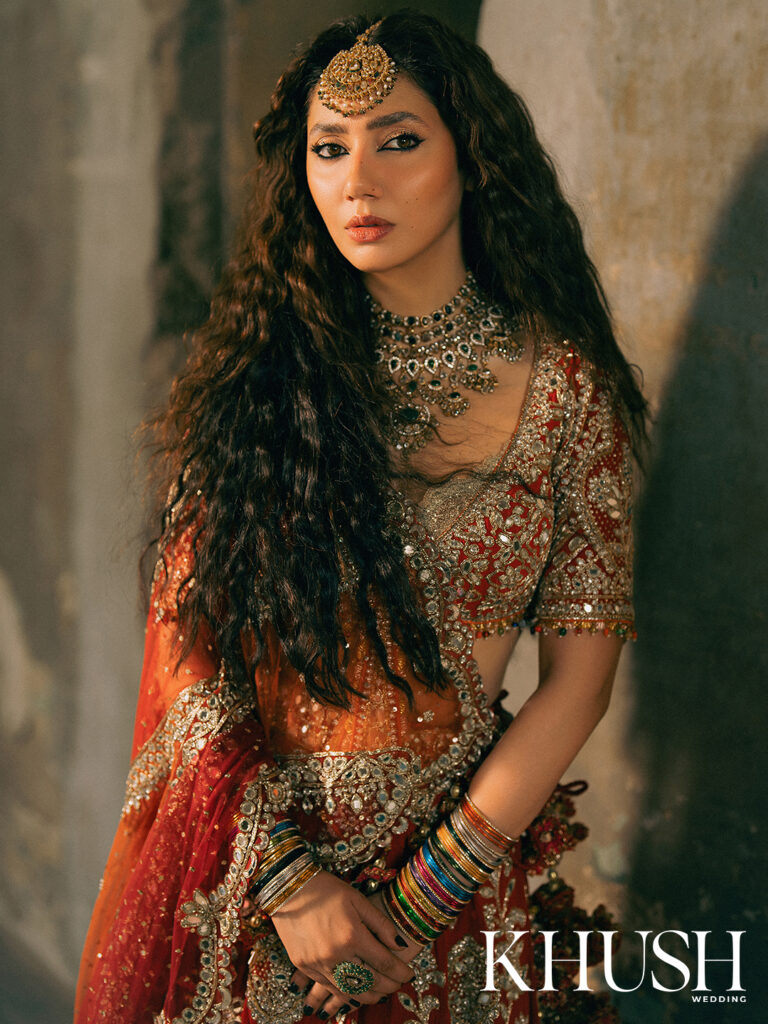
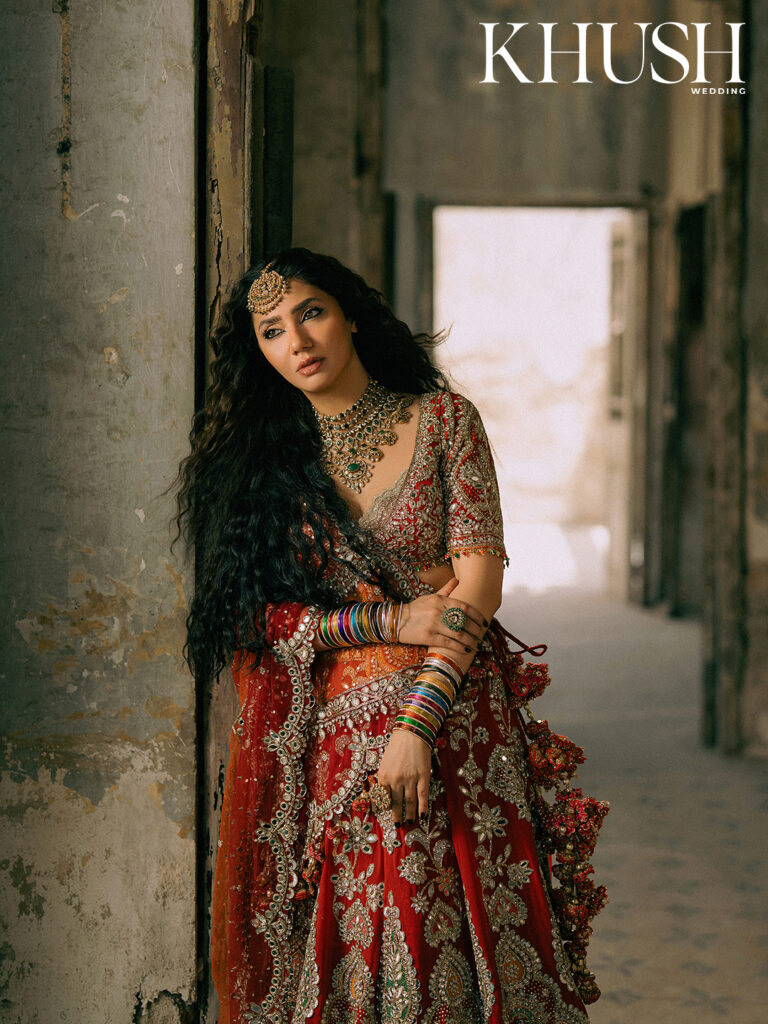
“TV has had a huge impact on my career,” she says, acknowledging its profound role in shaping her trajectory. Her debut, a film called ‘Bol’ and the soap drama ‘Humsafar’, both premiered in 2011 almost simultaneously. “It was ‘Humsafar’ that catapulted me into success. People started loving my work or recognising me.” But Mahira’s relationship with her medium runs deeper than mere career strategy. She understands the cultural significance of television in South Asian homes, where families gather around screens and form daily connections with the characters who visit their living rooms.
“As a child, my mother said I was quiet and reserved. But I was a dreamer too. Always dreaming of being in the movies.“
She points out that unlike the film industry, which has faced constant talk of “revival”, Pakistani television has consistently churned out gems, from the 80s to today. This, she believes, is because “the talent that started coming into television were some of the best of the best, whether it was the writers, directors or actors. As an actor, there is nothing more satisfying than a long form format,” she adds. It’s this commitment to storytelling in all its forms that sets Mahira apart in an industry often obsessed with hierarchy.
But she describes herself as a “hybrid model”, referencing her passion and position straddling both television and film, across light roles and devastatingly heavy ones.
The Weight of Plots, the Lightness of Being
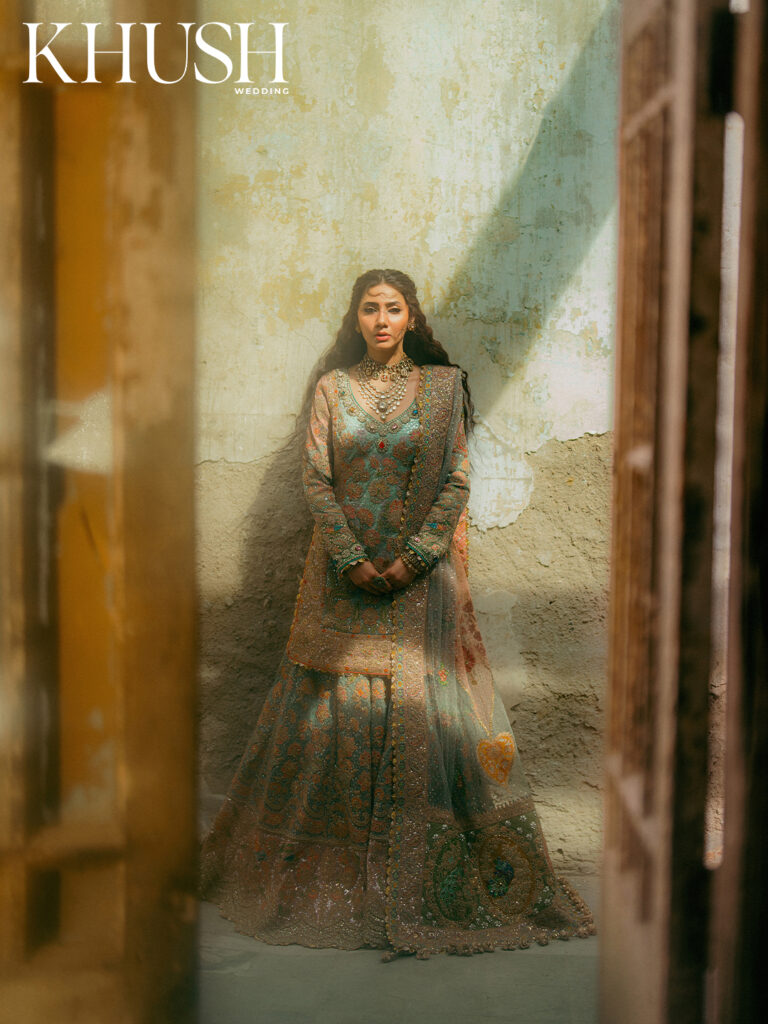
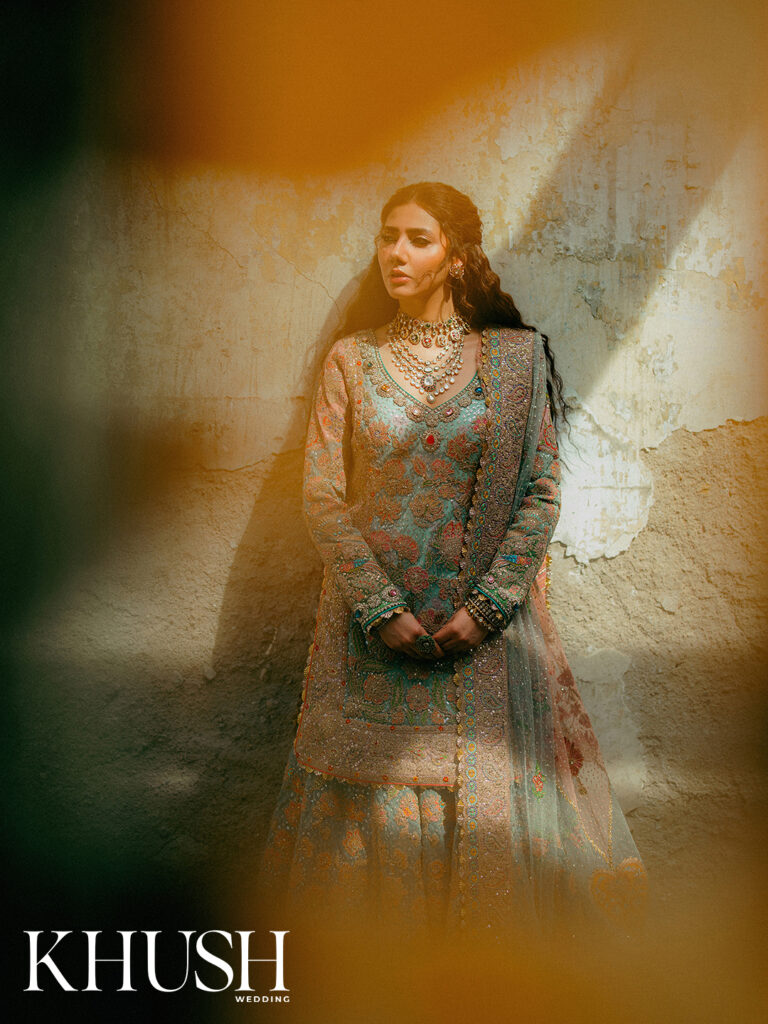
When I ask about her most relatable character, she doesn’t hesitate, “I felt very connected to Khirad from ‘Humsafar’. I was very young back then, and I had a little bit of Khirad in me.” Her entire demeanour shifts as she talks about Khirad what I can only describe as character space—that liminal zone where actor and role begin to blur. Her much-awaited project for Netflix, ‘Jo Bachay Hain Sang Samait Lo’, is one she admits scared her. “It’s a dark, layered character. The kind of role that stays with you. My process is obsessive. I make playlists for every character. I keep reading the script, circling things that pinch me. Sometimes, I carry them home without realising it. My husband Salim has often asked me, ‘Are you upset with me?’ And I land up explaining, ‘No, I’m upset with my husband in the film.” She chuckles, but it’s the chuckle of someone who knows that great art always exacts a cost.
“Actors are weird. We do strange things to separate ourselves from the people we become.”
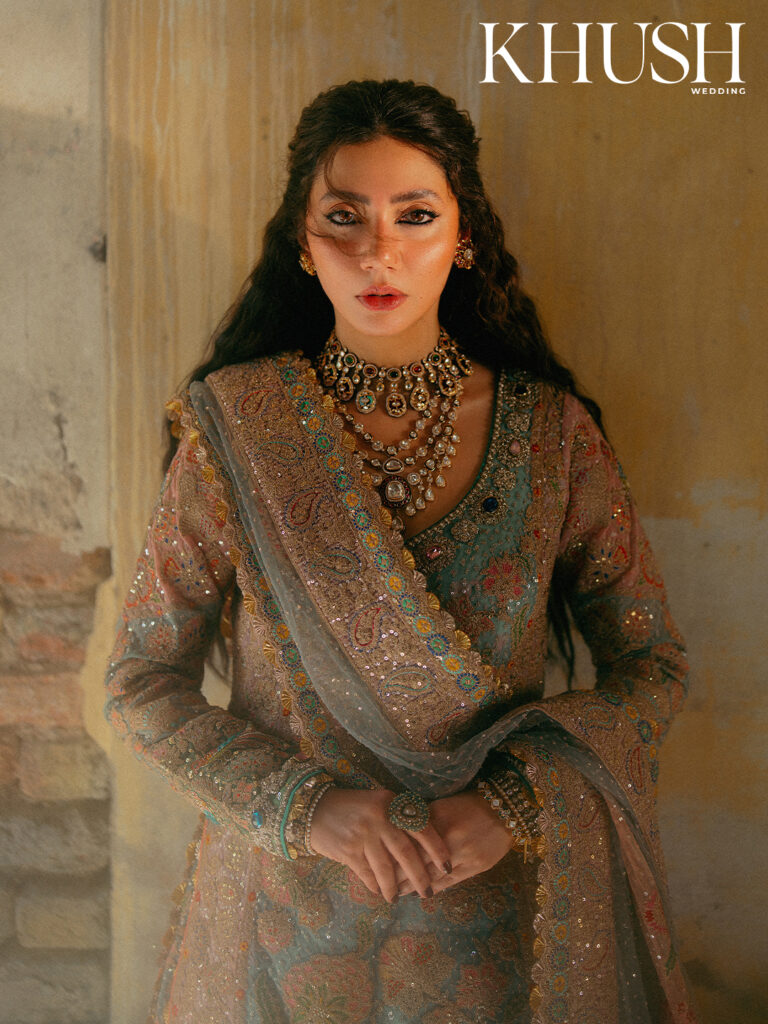
As we talk, she recounts filming ‘Verna’, a rape survivor’s role so emotionally taxing she once came home and “took a shower and kept scrubbing myself. There was something about it that was making me feel like I’m getting her off me. Actors are weird,” she says with her self-deprecating laugh. “We do strange things to separate ourselves from the people we become.” And yet, she wouldn’t trade it. This willingness to dive into complex, morally ambiguous territory speaks to Mahira’s evolution as an artist. While her contemporaries chase trends and box office numbers, she’s been quietly perfecting something far more elusive: the art of emotional transparency. On screen, she doesn’t just perform feelings, she transmutes them, offering audiences not just entertainment but also genuine catharsis.
The Co-Star Who Keeps Returning
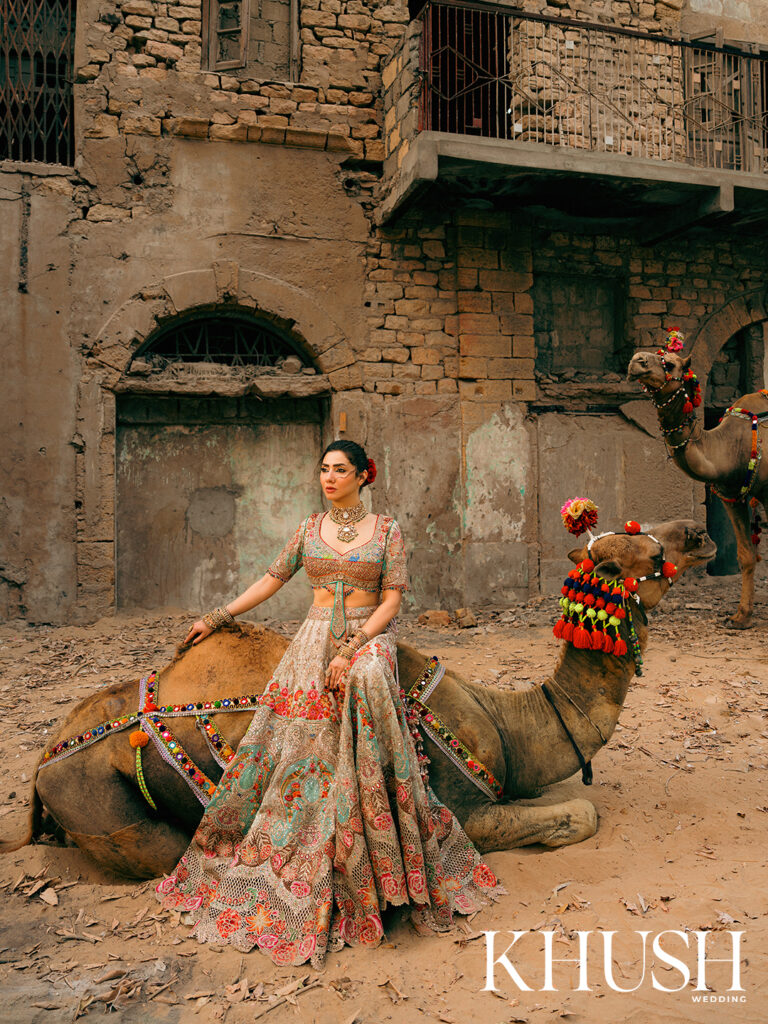
Most recently, there’s ‘Neelofar’, a long delayed, yet highly anticipated project. This film features a character that has truly stayed with her. “Very rarely do I say I became someone. I became Neelofar. Fawad, who is also my producer, sent me a message saying, ‘You are Neelofar.’ That meant so much.”
I ask her about Fawad Khan, her most frequent collaborator and co-star in ‘Humsafar’, ‘Maula Jatt’, and now, ‘Neelofar’. Her face softens. “Fawad and I have had this journey together. Ek saath bahut success mili hum dono ko. We share so much history and mutual respect. Of course, we’ve had our separate journeys, too, but somehow, we keep finding our way back to each other for various projects,” she shares of their unspoken understanding on screen that has translated as deep camaraderie off screen. So much so that Fawad was part of Mahira’s big day.
The Fairytale Wedding
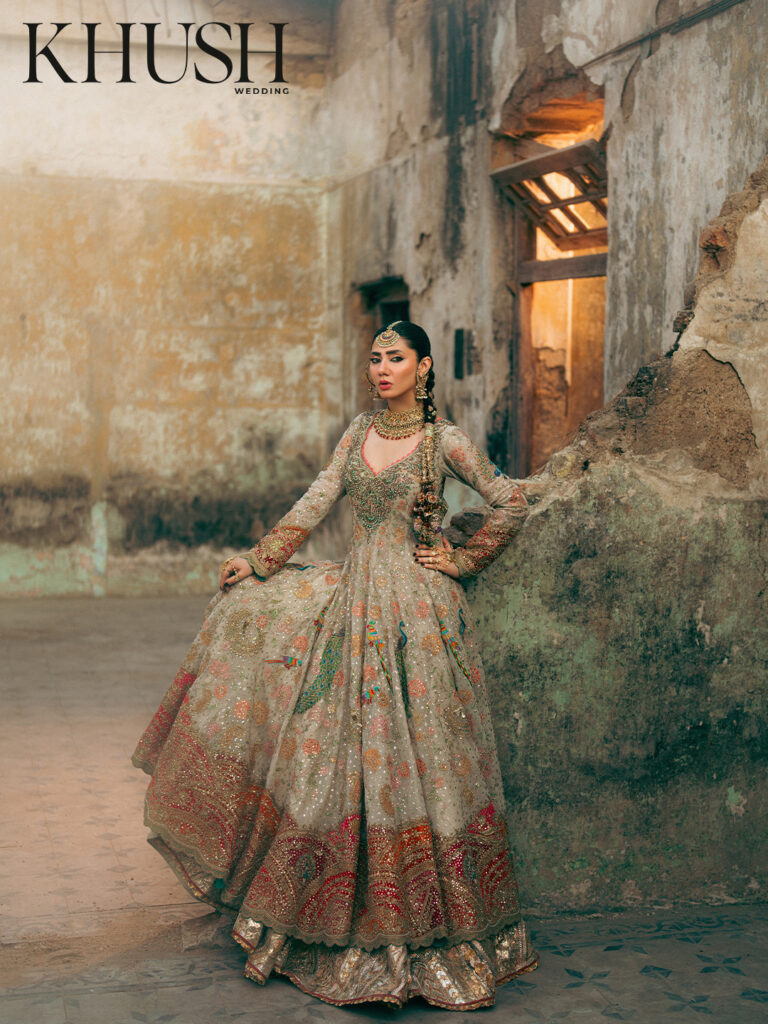
Our conversation naturally drifted to her wedding. Her nikaah ceremony, intimate and breathtaking, struck a chord with millions who saw in it a celebration of authentic love over ostentatious display. She walked down the aisle to her husband, Salim Karim, with her son Azlan by her side. “I always wanted that,” she says about having Azlan give her away. “It was emotional. It’s very nice.”
“I always wanted Azlan to walk me down the aisle. It was very emotional. It’s very nice.”
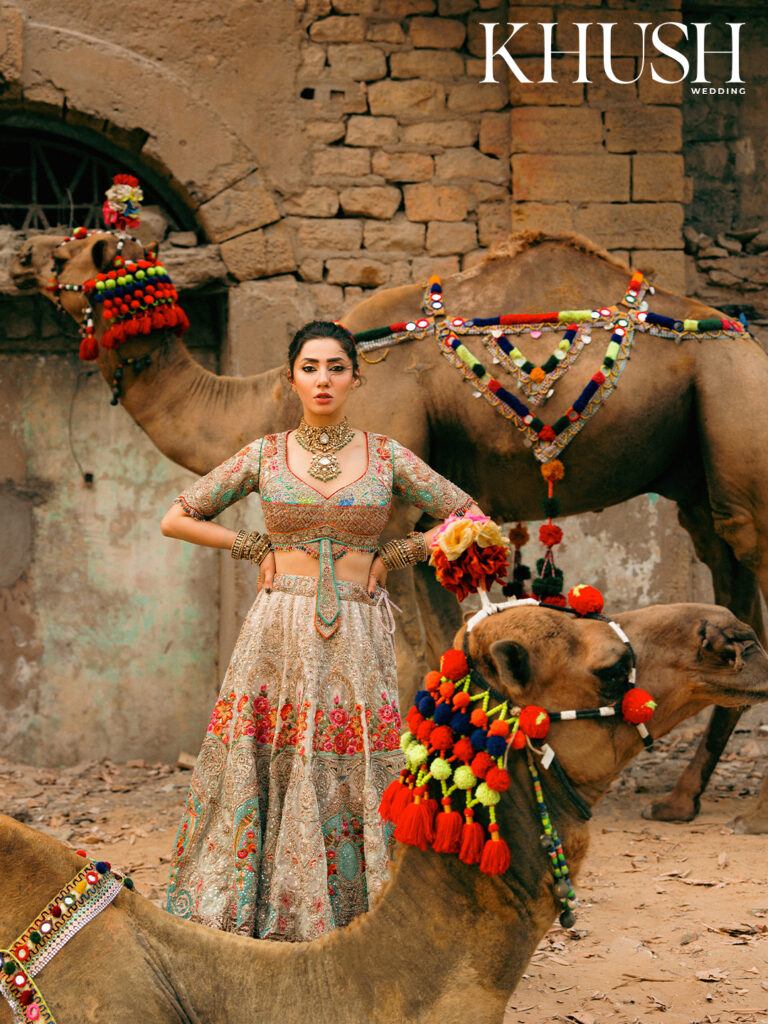
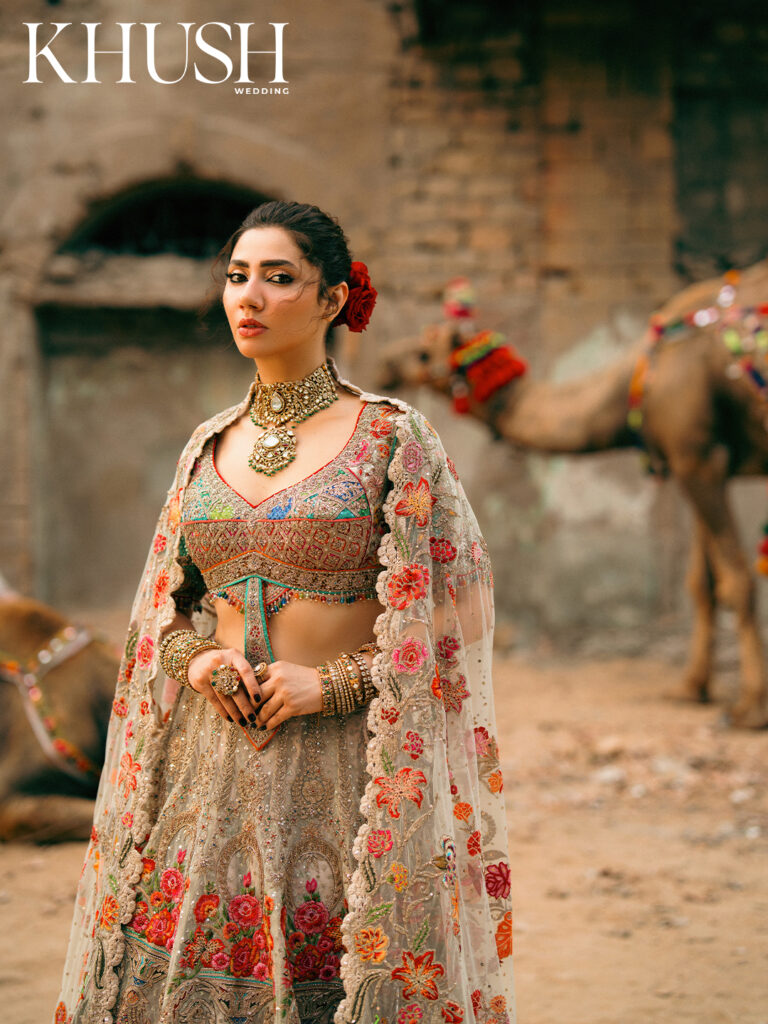
Her bridal joda, a Faraz Manan creation, was a dream of ivory and blue, meticulously crafted from elements she’d subconsciously curated over the years on her Pinterest boards. “All of those things were in my wedding,” she says. The choice of her outfit was serendipitous: “I saw this one on the mannequin and just tried it. Those sleeves just did it for me. My reflex was ‘this is it’. It was love at first sight.”
Her wedding pictures, iconic as they are, were unposed, unplanned. “I told my manager Anushay and the team, ‘I don’t want curated pictures’,” she recalls. The wedding, with its perfect golden hour lighting, genuine joy shared by loved ones, minimalism and candid pictures, wasn’t just beautiful, it was authentic to who Mahira is.
The Family Girl
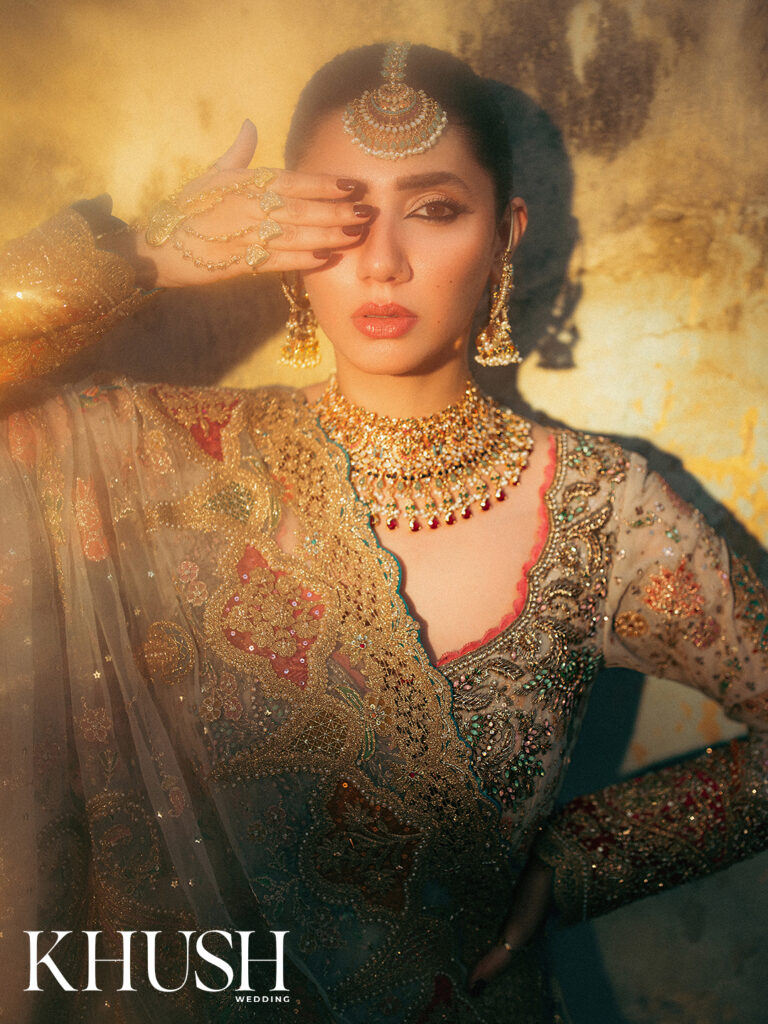
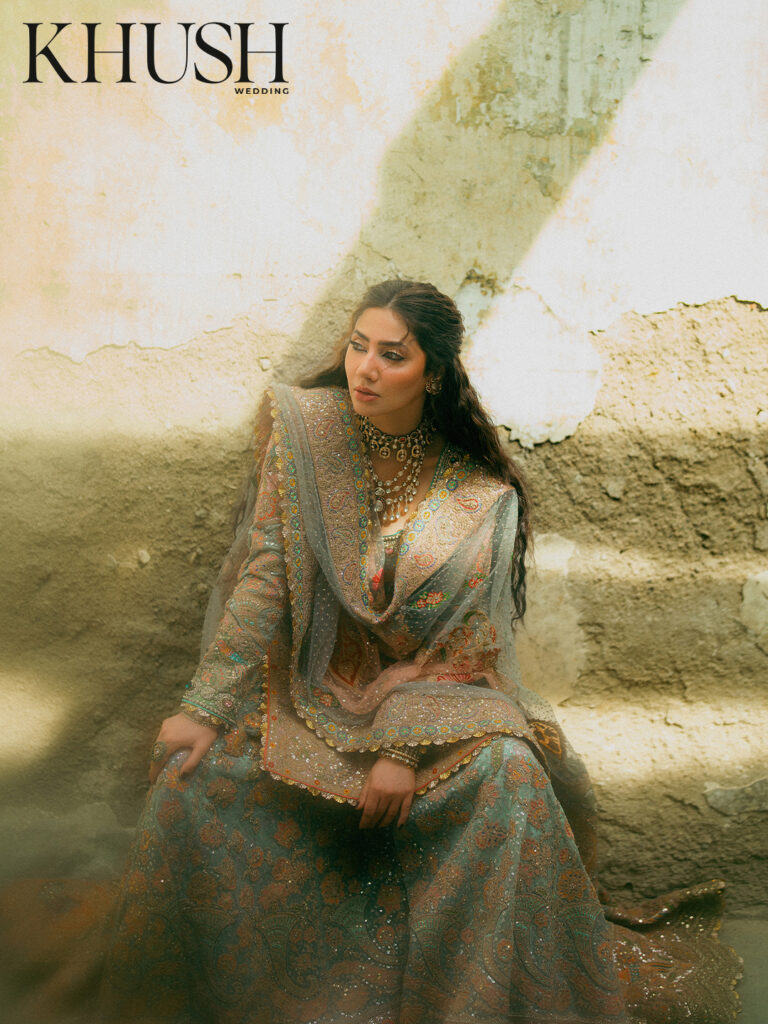
The profound impact of marriage on her life is evident. “My favourite part is I am home no matter where I am. If Salim’s around, I feel like I’m home. And it’s how I feel with my son Azlan. It’s your person. And if they’re around, that’s my home.” She speaks of building a life with her partner, of navigating the “ups and downs” and still being “grateful for the little things”.
As our chat winds down, I ask her advice on love for the younger generation, she humorously deflects, “Oh, man, I think they’d give me advice.” Yet, she carries the wisdom of someone who has learned to protect what matters. “When love does come, one needs to be mindful in protecting it and looking after it. Because I have faltered many times there.” For marriage, she offers a pragmatic yet hopeful perspective: “If you have a good partner, you thrive so learn to be patient. And if it’s a bad one, then you can have the worst life ever. But then, have the guts to get up and leave.” This powerful statement underscores her strength and self-respect.
The Reel And Real Star
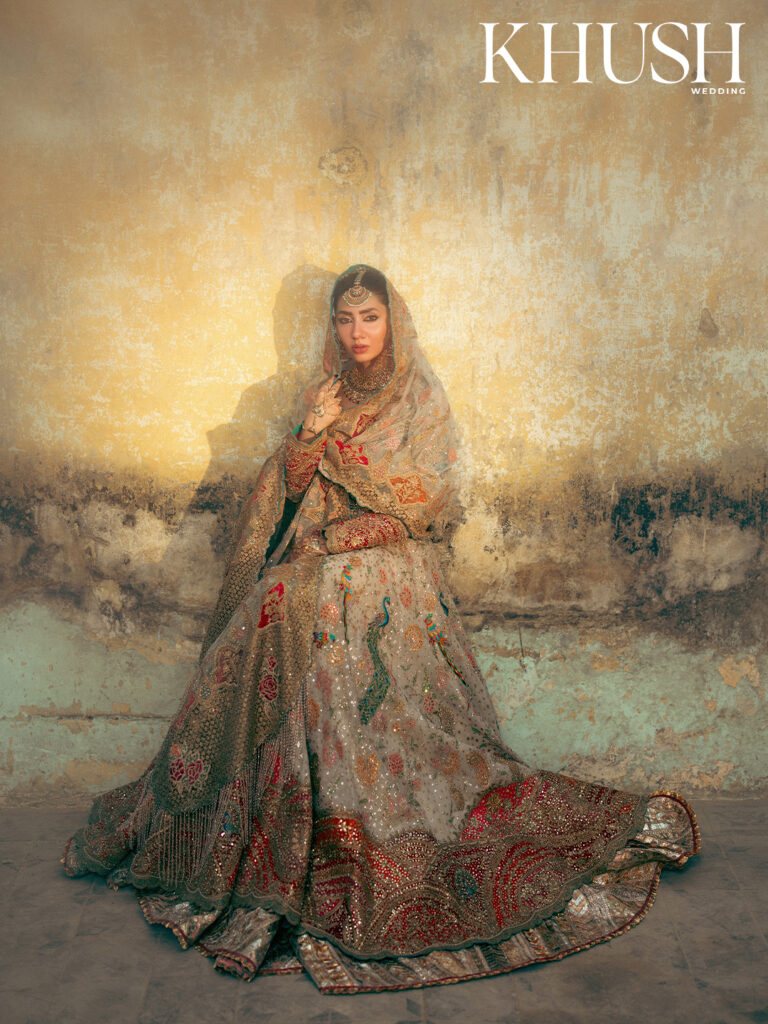
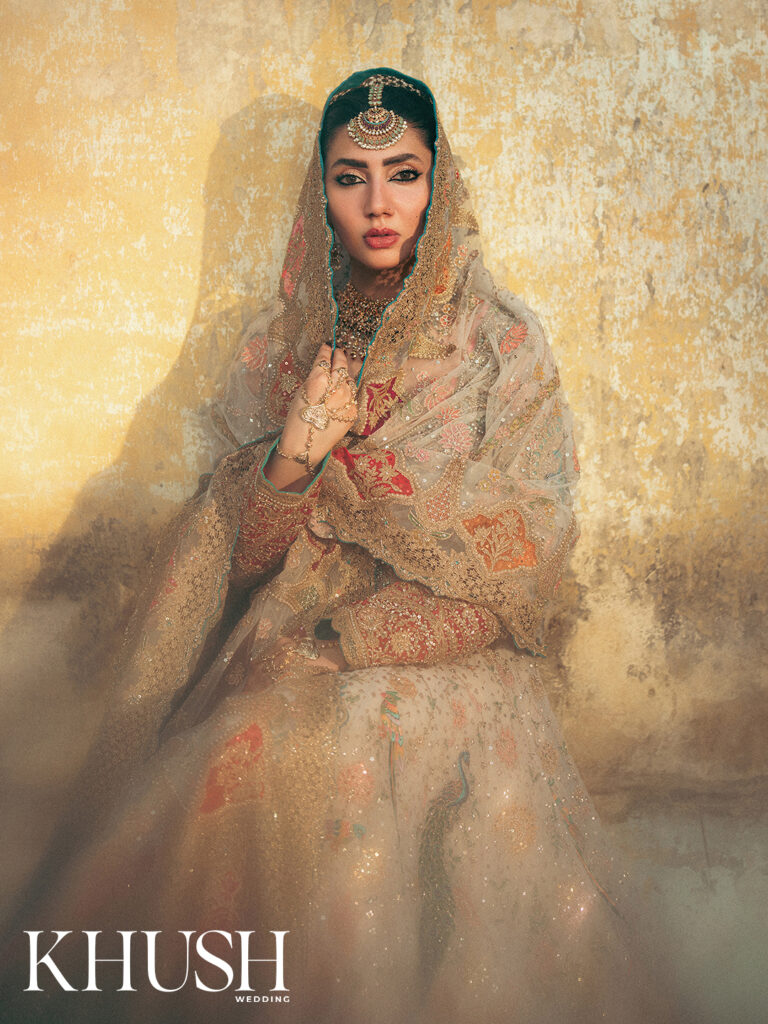
What strikes me most over the course of our conversation isn’t Mahira’s fame (though she is arguably Pakistan’s most celebrated star, the superstar who graced Cannes red carpets and the actor who held her own opposite Bollywood giants) but her realness. She doesn’t hide behind glossy anecdotes or pre-prepared soundbites. She’ll tell you when she doubts herself. She’ll tell you when she’s overwhelmed. She’ll tell you when she falls short. And maybe that’s Mahira’s greatest magic. She’s not one or the other. She’s all of it.
Deep dive into the exclusive interview and cover shoot with our very first Pakistani cover star in the latest edition of Khush Wedding. We’re also excited to bring you all the trends you need to bookmark for the season, from destination wedding dressing to décor decadence. And the honeymoon destinations worth flying across the world. Get your copy by clicking HERE.
Editor in-chief: Sonia Ullah
Photographer: Asad-Ullah Bin Javed
Dressed in: Rimple & Harpreet
Jewellery: Hamna Amir Designer Jewelry
Art direction: Mues Concepts
Creative Director: Manni Sahota
Fashion Editor: Vikas Rattu
Junior Fashion Editor: Tanishq Malhotraa
Styling team: Zahra Sarfraz, Tanishq Malhotraa, Vikas Rattu
Words and interview: Nupur Sarvaiya
Hair: Awais Raza
Makeup: Babar Zaheer
Video: Muzammil Garewal
Styling assistants: Malaika Pervezz, Alizeh Mughal, Fiza Mukaty
Management: Anushay Talha Khan



